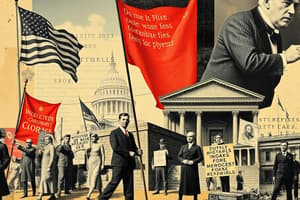Podcast
Questions and Answers
What event is primarily considered to have triggered World War I?
What event is primarily considered to have triggered World War I?
- The assassination of Franz Ferdinand (correct)
- The Zimmermann Note
- The sinking of the Lusitania
- The signing of the Treaty of Versailles
Which factor contributed to the United States declaring war in 1917?
Which factor contributed to the United States declaring war in 1917?
- The failure of the League of Nations
- American interests in European territories
- Germany's unrestricted submarine warfare (correct)
- Domestic economic policies
Which of the following was a result of the United States joining the Allies in World War I?
Which of the following was a result of the United States joining the Allies in World War I?
- The Treaty of Versailles was ignored
- The League of Nations was formed immediately
- The Central Powers launched a successful counterattack
- Allies began winning many battles (correct)
What was the primary aim of the Treaty of Versailles?
What was the primary aim of the Treaty of Versailles?
What characterized the Roaring Twenties in the United States?
What characterized the Roaring Twenties in the United States?
Which event marked the end of the Roaring Twenties and initiated the Great Depression?
Which event marked the end of the Roaring Twenties and initiated the Great Depression?
What was one major consequence of the political landscape changes in the 1920s in America?
What was one major consequence of the political landscape changes in the 1920s in America?
Which scandal was associated with President Warren G. Harding's administration?
Which scandal was associated with President Warren G. Harding's administration?
What economic condition characterized the post-World War I United States before the stock market crash?
What economic condition characterized the post-World War I United States before the stock market crash?
Which countries were part of the Triple Alliance during World War I?
Which countries were part of the Triple Alliance during World War I?
What was one significant social issue addressed during the Progressive Era?
What was one significant social issue addressed during the Progressive Era?
Who coined the term 'muckrakers'?
Who coined the term 'muckrakers'?
What legislation was inspired by Upton Sinclair's work?
What legislation was inspired by Upton Sinclair's work?
Which of the following best describes the focus of progressivism?
Which of the following best describes the focus of progressivism?
What was one outcome of Ida Tarbell's 'The History of Standard Oil'?
What was one outcome of Ida Tarbell's 'The History of Standard Oil'?
During the Progressive Era, which group saw little change in their social status?
During the Progressive Era, which group saw little change in their social status?
What prompted the emergence of the Progressive Era?
What prompted the emergence of the Progressive Era?
Which muckraking magazine did prominent journalists write for?
Which muckraking magazine did prominent journalists write for?
What was the main goal of progressives concerning governmental action?
What was the main goal of progressives concerning governmental action?
How did Theodore Roosevelt view the ills of society?
How did Theodore Roosevelt view the ills of society?
Flashcards
Triple Entente
Triple Entente
An alliance between Great Britain, France, and Russia before WWI.
Nationalism (WWI)
Nationalism (WWI)
Pride in one's nation leading to conflict in Europe.
Militarism (WWI)
Militarism (WWI)
Increased military spending and troop recruitment.
Lusitania
Lusitania
Signup and view all the flashcards
Zimmermann Note
Zimmermann Note
Signup and view all the flashcards
Franz Ferdinand's assassination
Franz Ferdinand's assassination
Signup and view all the flashcards
Unrestricted Submarine Warfare
Unrestricted Submarine Warfare
Signup and view all the flashcards
Roaring Twenties
Roaring Twenties
Signup and view all the flashcards
Wall Street Crash
Wall Street Crash
Signup and view all the flashcards
Treaty of Versailles
Treaty of Versailles
Signup and view all the flashcards
Progressivism
Progressivism
Signup and view all the flashcards
Progressive Era
Progressive Era
Signup and view all the flashcards
Muckrakers
Muckrakers
Signup and view all the flashcards
World War I Causes
World War I Causes
Signup and view all the flashcards
Alliances (WWI)
Alliances (WWI)
Signup and view all the flashcards
Imperialism
Imperialism
Signup and view all the flashcards
Militarism
Militarism
Signup and view all the flashcards
Nationalism
Nationalism
Signup and view all the flashcards
Pure Food and Drug Act
Pure Food and Drug Act
Signup and view all the flashcards
Meat Inspection Act
Meat Inspection Act
Signup and view all the flashcards
Study Notes
Progressivism
- Progressivism focused on improving society as a means of improving the country.
- Politicians like Bryan and La Follette promoted progressivism in local government.
- Theodore Roosevelt supported it, believing societal reform strengthened the nation.
- Issues like child labor, working hours, and alcoholism were addressed during the Progressive Era.
- Women's suffrage was a result of protests and changing attitudes.
- African Americans and other people of color saw little progress during this era.
The Progressive Era and Muckrakers
- The Progressive Era emerged due to Gilded Age corruption in the 1890s.
- Muckrakers, journalists like Steffens, Tarbell, and Baker, exposed corruption and business malpractices.
- Their work pressured the public and government officials like Roosevelt.
- Ida Tarbell's work led to the breakup of Standard Oil.
- Muckrakers like Sinclair influenced legislation like the Pure Food & Drug Act and Meat Inspection Act.
- Muckraking's popularity declined by 1912, but its impact remained.
Causes of World War I
- Alliances: Nations formed agreements to protect interests. The Triple Entente and Triple Alliance were prominent.
- Nationalism: Increased national pride and connection led to competition and conflict.
- Militarism: Increased military spending, weapons production, and recruitment.
- Imperialism: Competition for power globally heightened tensions in Europe.
US Entry into World War I
- The US initially sought neutrality.
- American sympathies favored Britain.
- The sinking of the Lusitania fueled U.S. outrage.
- The Zimmermann Note, a German proposal to Mexico, was a key factor.
- The U.S. declared war in April 1917.
World War I End and Aftermath
- American entry convinced Central Powers of inevitable defeat.
- The Paris Peace Conference established the Treaty of Versailles.
- France and Britain strongly wanted to punish Germany.
- Many groups involved in the war were excluded from the treatymaking process.
- The League of Nations, a key fourteen point, faced U.S. Congressional opposition. Many of the fourteen points were largely ignored.
The Roaring Twenties
- The 1920s saw economic and cultural prosperity in the U.S.
- Technological advancements fueled consumerism.
- Corporations like Ford innovated manufacturing and advertising.
- Middle-class Americans adopted consumer goods (radios, cars).
- Increased consumer debt due to heavy borrowing.
- Flappers represented liberated women.
- President Coolidge was seen as a figure that led this era.
The 1920s: Political Landscape
- Post-WWI political atmosphere, absence of Wilsonian ideals
- Warren G. Harding promised a return to normalcy
- Harding pursued tax cuts and economic recovery.
- Corruption, namely the Teapot Dome Scandal, marred Harding's administration
- Calvin Coolidge took over, followed by Herbert Hoover.
- Coolidge favored business and led to prosperity ("Roaring Twenties").
- The Stock Market Crash of 1929 ended the period of prosperity.
Studying That Suits You
Use AI to generate personalized quizzes and flashcards to suit your learning preferences.
Description
Explore the transformative impact of Progressivism during the Progressive Era, highlighting key figures like Theodore Roosevelt and the role of muckrakers in exposing societal issues. This quiz delves into the challenges faced during this time, including labor rights and suffrage movements, as well as the limited progress for African Americans. Test your knowledge of this pivotal historical period.




